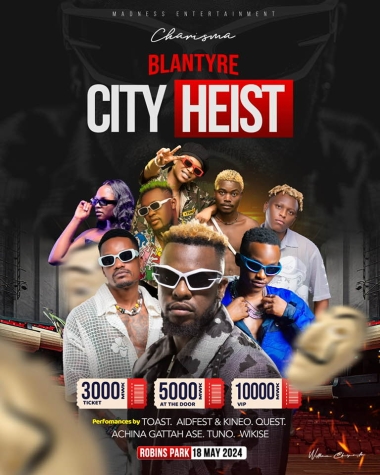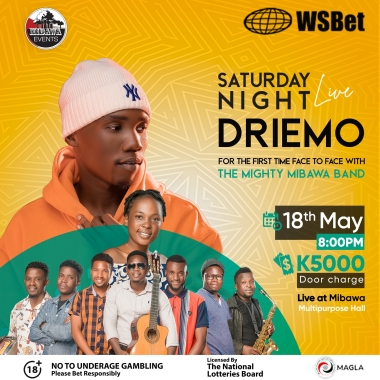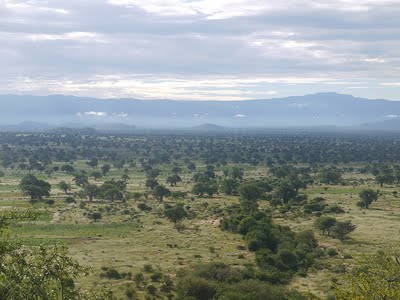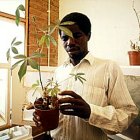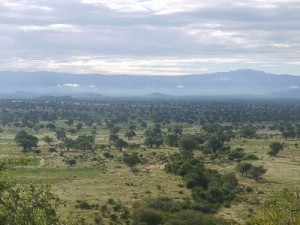
“We make a living by what we get, but we make a life by what we give.” – Winston Churchill
I no longer run for cover when the sky blackens, when the thunder booms or when electricity lights up the gloom. It’s when the locals head inside that I know we’re about to get a soaking. That night in Western Tanzania the road threading through the murk was empty and when the rain began it was more intense and ferocious than I have ever seen. With no cover nearby we plowed on, smothered in green ponchos, grimacing against the deluge. Lightning sparked every second and sheets of rainfall blasted the tarmac. It became impossible to hear anything over the rain’s deafening patter and my eyes welled up. Water must be getting in somewhere. A turbulent torrent of water gushed by the road’s edge. A pick-up stopped, the driver addressed us in a German accent and offered a lift. The next town was at least twenty five kilometres away he told us. We declined and waved him on. The bombardment continued, water permeated my poncho. I didn’t think we’d make the town before dark, equally I couldn’t imagine pitching a tent without creating an indoor swimming pool. I blotted out any thoughts of how we’d see through the night, our only task now to cycle and hopefully towards somewhere or something better. The German in the pick-up returned after half an hour. He was giving us another chance to change our minds. He worked for Strabag, a German company building the roads in this part of Tanzania. Their compound was twenty kilometres up ahead. I looked at Nyomi and knew she was getting into that truck before she had said anything. My turn to decide. I shouted to the driver through a crack in the truck window.
‘Thanks but I’ll be OK’
‘Get in. These are extreme conditions. Its very dangerous’ he bellowed back
‘I’m sorry I can’t. I know it’s a bit crazy’
‘It’s very crazy! You are very crazy!’
‘Tell me why it’s dangerous?’
‘The lightning. The trucks. The dark. The bandits. You shouldn’t camp here. We close this road at night. Vehicles get hijacked.’
‘Nyomi’s coming with you. I’ll meet you there’
‘Your friend is safe with us. I hope you make it. There will be a cup of tea waiting for you when you arrive. Good luck’
He hadn’t convinced me. No way bandits would be out in this. I’ll pull off the road when a truck comes. The lightning? I’ll take my chances. They pulled away and not for the first time I wondered whether pride, ego and blind optimism were leading me down a path I didn’t want to be on. But I had one thing to get me through… the thought of that big cup of warm tea. That’s all I needed to muster the strength for the twenty five kilometre dash. Soon I was alone and immersed in the deep blackness of nightfall in the African bush, but the rain slowly cleared and forty five minutes later I reached the compound. I had envisioned a small hut, perhaps, I thought, I could sleep on the floor, and I could almost taste the warm milky tea. I entered a very different world to the one of my imagination. The compound appeared to be more like a small town. I saw the German at the gate.
‘Hi. Where’s Nyomi?’
‘Oh she’ll probably be in your chalet’
‘Our ch… our what?’
‘Yeah your chalet. Or if not then maybe at the bar’
‘The baaa?’
‘The bar. Over there, you see? Between the swimming pool and that tennis court.’
I couldn’t be sure how I had met my end but perhaps it was a lightning strike, perhaps it was a speeding truck.
‘We can wash your clothes and you can eat in the restaurant over there. Oh and we’re having a party tomorrow night. There will be a big barbecue with loads of kebabs and the bar’s free. Just help yourself to a beer whenever you want.’
Who’s going to tell my poor mum
‘We also have table tennis, table football, darts, a gym. Take a break. You guys need it.’
Then I saw a beaming Nyomi. This was real. In the middle of rural Tanzania we had come across the equivalent of Centre Parks. The compound had been built for the multinational team of engineers and it would be grounded after their three year contract was up. We retired to the warmth of our chalet. There’s nothing like washing with a cold bucket of cold water every third day to make you appreciate the next warm shower. I grinned at Nyomi.
‘Oh my god. Score!’
‘Yeah! Shall I put the kettle on?’
We both laughed heartily
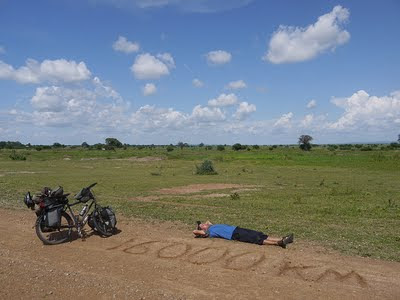 |
| Milestones… |
We were cutting a diagonal across Tanzania from the Rwandan border, aiming for capital Dodoma, and I was in pain. I had developed a nasty tendonitis of my right wrist, I could feel the swollen tendons crunching beneath the skin. It was the result of the repetitive use of the grip shift on my bike (and not what Nyomi liked to insinuate). Late one night we found ourselves without a spot to camp with a broken stove. We were escorted to a nearby village by some local men where a large family let us use their charcoal burning cooker. The children were dirty, clad in tatty rags and covered in flies. One three year old held a large machete. Nobody in Tanzania seems to think giving a toddler a large sharp pointy thing isn’t the brightest idea. They were evidently poor but welcomed us into their community without asking for a thing and without suspicion or a second thought. It was not the last act of kindness we would experience over the next few weeks. The hills gradually transformed into grassy savannah, pastoralists replaced arable farmers and shawls and sticks characteristic of the Masai tribe were visible once again. In Dodoma Nyomi and I parted ways. She wanted a break in Zanzibar, I’d been there eight years ago during an overland trip I had taken through East Africa so we agreed to meet again in one week’s time in Mbeya near the Malawian border. Goodbye Nyomi, goodbye tarmac, karibou rural Tanzania and solitude. I probably needed it. My route south was again peppered with strangers helping me out at every turn. One night a group of nuns took me into their convent and fed me pasta and coffee before giving me a bed for the night. A Estonian motorcyclist stopped and invited me to join him and some mates for wine and pizza before again letting me crash. Then a British guy called Mark stopped me on the road to hand me fruit juice and nuts. Later that day I arrived at the campsite I had told him I was planning to stay at and the manager came out to greet me.
‘You don’t need your tent’
‘What?’
‘Put it away. You’re staying in the lodge tonight. And you’re having dinner. And breakfast tomorrow. A friend has you covered’
‘Mark?’
‘You got it!’
 |
| Me and the Sisters of the Holy Family |
| The Tanzanian sense of humour |
Cycling through Malawi feels a bit like I’d imagine it would feel to bung on a santa outfit on Christmas Eve and charge into a room full of excitable five year olds. The feel good factor for riding through one of the most densely populated countries on earth is massive and I think maybe equal in measure only to Rwanda. Our mere presence, the white face and the loaded bicycle, was enough to induce wide smiles in almost everyone who spotted us ride by. I spent so much time reciprocating that by the end of the day my face would ache. Malawi felt like one big village rather than a collection of many and there were more bicycles here than any where else I’ve been, many transporting hauls of fish or several chickens or up to four people or occasionally a couple of bound and bleating goats. It must be the easiest country in Africa for the cyclist. It’s nice and flat along the lake, it’s full of campsites, resorts and backpacker hangouts, there are water pumps and boreholes every five or ten kilometres, the main roads are perfect tarmac with hardly any traffic and the helpful Malawians often speak good English. If you have a three week holiday on the cards… go cycling in Malawi. We swung towards the lake and drifted past piles of drying fish, then through woodland and past crops of casava, we tried to avoid the expensive resorts choosing instead to rough camp by schools or hospitals or police stations.
Even in Africa, a musical continent, Malawi stands out. Sound systems blare from every bar and every cafe in every village, women sing to the babies on their backs, men sing when they drink Chibuku, children grab your hand and burst into song and teenagers sing into light bulbs mimicking microphones. To me Malawian women look more stereotypically African than most. Usually one baby will be wrapped by cloth to her front suckling on a breast, another is sometimes wrapped to her back, in one hand she holds a colourful umbrella to protect from the heat of the day and on her head will be some variety of package, anything from a bulky sack of maize, firewood, some food, a full bucket of water or even just a pair of shoes. On one day in Malawi I stopped to fill up my water bottle at a pump. There were some young children playing at their mother’s feet when I arrived. They looked up and reacted immediately. One screamed and fled panic stricken into the bush. Three more rushed behind their mothers, their terror filled eyes peeped out at me from behind their mother’s kangas. All of them had burst into tears. The mums found all this hysterical but their laughter did nothing to allay the children’s fears. We’d seen this reaction once before in Sudan. I was probably the first white person the kids had ever seen.
One of the many quirks of Malawi is that the young men, especially those in and around the tourist spots, give themselves strange and wonderful English nicknames. I’d hear conversations like this one…
‘Hey have you seen Lazer or Fortune?’
‘Nah. There’s a party tonight though. Chicken & Peas is coming’
‘Cool. How about Lucky Coconut?’
‘Not sure. He’ll probably be hanging out with Happy and Mr Spanner’
I’d like to say something a bit more profound about my experience in this part of Malawi. I’d like to make some comments on the local culture and traditions or perhaps make some observations about the national psyche. I’d like to, but I can’t. Once we hit the lake I was introduced to XXX, a scanderlously cheap brand of rum sold in thirty mililitre sachets and after this point Malawi gets a little out of focus. There were defintiely lots of backpackers, I think there were parties and I have heard only rumours of our mock breakdancing, skinny dipping and other antics.
Like most of the capital cities in the sweltering tropics Lilongwe sits in the hills, over a thousand metres up. We climbed up from the lake shore and were riding through a small village when we sighted two figures in the road ahead. They were running towards us, grunting and growling in unison. As they got closer I felt a sudden chill when I caught sight of their wretched and bedraggled appearance. They were clad in muddy rags, their faces were under cloth and completely hidden from view. In each hand they carried machetes which they waved erratically and with vigour. They resembled how the undead might be depicted in a Hollywood blockbuster. Children scattered as they came close. I turned to a local man beside me.
‘Whats going on?’
‘This is Chewa culture’
‘Is it a game?’
He laughed loudly. This wasn’t a game.
‘They want money’ he said
Even the adults around looked genuinely afraid. I have since learnt that these were ‘Gule’ – young men dressed as ancestral spirits, members of a secret society. Gule are considered to be in ‘animal state’ when they are dressed in such attire, and are not to be approached. If one has the misfortune of passing a Gule on the road, traditional behaviour consists of dropping a few coins for the Gule – never handing them the money directly for fear they will grab you and take you to the cemetery for ritual purposes. Generally, villagers believe it is best to avoid Gule, in their animal or ancestral state, they are unpredictable.
The theme of this post has been hospitality, although really that’s been the theme of my entire journey so far. In every country I have passed through there has been at least one act of generosity from a stranger who expects nothing in return. I have never been refused water and only very rarely a place to camp. This month has been a outpouring of hospitality from ex-pats and locals, from men and women, from the young and old, from the rich and poor. When we arrive into Cape Town I know that a lot of people had a hand in getting me there, there will be lots of people to thank.
This week I received an email that had my memory drifting back to a golden evening in the desert of Northern Sudan and another act of kindness. It was the end of a long day. We had covered over 150 km and the light was fading when three quad bikes zoomed past us. They stopped up ahead. It was Val, Jamie and Kris, three young Australians on a mission to break the Guinness World Record for the longest ever journey by quad bike. They invited us to camp with them and waited for us up ahead. We turned off into the sand and spent the evening chatting and sharing food. This week I received the news that in Malawi Val had collided with a vehicle traveling on the wrong side of the road, the car was being pursued by police. He was seriously injured in the crash and airlifted to Johannesburg. Very tragically Val died on the flight. Val, Jamie and Kris were just some of the people who have helped us on our journey and I remember Val’s generosity, enthusiasm and passion for adventure. The other member of the ‘Quad Squad’ will continue in Val’s memory.
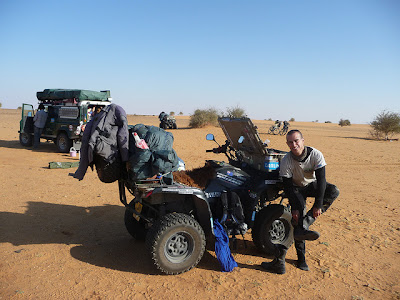 |
| Kris from ‘Quad Squad’ |
Email This BlogThis! Share to Twitter Share to Facebook Share to Google Buzz at Saturday, April 30, 2011 ![]()


.jpg&w=60&q=100&h=60)




